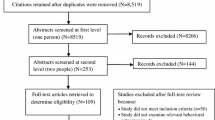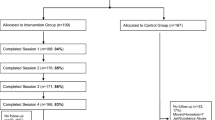Abstract
The study examined the efficacy of a brief theory-based counseling intervention to reduce sexual HIV risk behaviors among STI clinic patients in St. Petersburg, Russia. Men and women (n = 307) were recruited to receive either: (1) a 60-minute motivational/skills-building counseling session dealing with sexual HIV risk reduction, or (2) written HIV prevention information material. Participants completed baseline, three- and six-month assessments in the period between July 2009 and May 2011. Compared to the control group, the face-to-face counseling intervention showed significant increases in the percentage of condom use and consistent condom use, and significant decreases in the number of unprotected sexual acts and frequency of drug use before sex. Intervention effects dissipated by 6 months. The brief counseling intervention may effectively reduce HIV sexual risk behaviors and enhance protective behaviors among STI clinic patients in Russia. Short-term positive effects were achieved with a single one hour counseling session.
Resumen
El estudio examinó la eficacia de una intervención breve para reducir el riesgo de transmisión sexual del VIH entre los pacientes de una clinica de infecciones de transmisión sexual en San Petersburgo, Rusia. Hombres y mujeres (n = 307) fueron reclutados para recibir: (1) una sesión de 60 minutos de una intervención para desarrollar la motivación y de las habilidades de reducción de los comportamientos sexuales de riesgo del VIH, o (2) información por escrito de la prevención del VIH. Los participantes completaron las evaluaciones al inicio del estudio, 3 y 6 meses en el período comprendido entre julio de 2009 y mayo de 2011. En comparación con los controles, el breve intervención mostraron incrementos significativos en el porcentaje del uso del condón, el uso consistente del condón, y disminuciones significativas en el número de relaciones sexuales sin protección y en el uso de drogas antes de tener sexo. Los efectos fueron significativos en las evaluaciones tres meses después de la intervención. La intervención breve puede reducir efectivamente los comportamientos sexuales de riesgo del VIH y mejorar las conductas de protección entre los pacientes de la clínica de ITS en Rusia. Efectos se podría lograr con una hora sesión de consejeria.

Similar content being viewed by others
References
United Nations: Department of economic and social affairs, population division, World Population Prospects. The 2008 Revision, Highlights, 2009, Working Paper No. ESA/P/WP-210.
AIDS Foundation East-West: Knowledge centre. HIV statistics for Belarus, Moldova, Russia and Ukraine. 2008. http://www.afew.org/knowledge-centre/hiv-statistics/ Accessed 18 Sept 2010.
UNAIDS/WHO. Aids epidemic update | global report. Geneva 2010.
UNAIDS/WHO. AIDS epidemic update: December 2005. Special section on HIV prevention. Geneva UNAIDS/WHO; 2005.
Ministry of Health and Social Development of the Russian Federation. Country progress report of the Russian federation on the implementation of the declaration of commitment on HIV/AIDS: Moscow; 2008.
WHO/Europe. Risk factors impacting on the spread of HIV among pregnant women in the Russian federation. Geneva WHO Press; 2007.
UNAIDS/WHO. Aids epidemic update: Eastern Europe and central Asia: Geneva; 2009.
Fisher JD, Fisher WA. Changing aids-risk behavior. Psychol Bull. 1992;111:455–74.
Simbayi LC, Kalichman SC, Skinner D, et al. Theory-based HIV risk reduction counseling for sexually transmitted infection clinic patients in Cape Town, South Africa. Sex Transm Dis. 2004;31:727–33.
Crosby RA, Salazar LF, Yarber WL, et al. A theory-based approach to understanding condom errors and problems reported by men attending an STI clinic. AIDS Behav. 2008;12:412–8.
Zhan W, Hansen NB, Shaboltas AV, et al. Partner violence perpetration and victimization and HIV risk behaviors in St. Petersburg, Russia. J Trauma Stress. 2012;25:1–8.
Zhan W, Krasnoselskikh TV, Niccolai LM, et al. Concurrent sexual partnerships and sexually transmitted diseases in Russia. Sex Transm Dis. 2011;38:543–7.
Abdala N, White E, Toussova OV, et al. Comparing sexual risks and patterns of alcohol and drug use between injection drug users (idus) and non-idus who report sexual partnerships with idus in St. Petersburg, Russia. BMC Public Health. 2010;10:676.
Abdala N, Grau LE, Zhan W, et al. Inebriation, drinking motivations and sexual risk taking among sexually transmitted disease clinic patients in St. Petersburg, Russia. AIDS Behav. 2011. doi:10.1007/s10461-011-0091-z.
World Health Organization. Alcohol use and sexual risk behaviour: a cross-cultural study in eight countries, Department of Mental Health and Substance Abuse. Geneva; 2005.
Abdala N, Zhan W, Shaboltas AV, Skochilov RV, Kozlov AP, Krasnoselskikh TV. Correlates of abortions and condom use among high risk women attending an STD clinic in St Petersburg, Russia. Reprod Health. 2011;8:28.
Regushevskaya E, Dubikaytis T, Laanpere M, et al. The determinants of sexually transmitted infections among reproductive age women in St. Petersburg, Estonia and Finland. Int J Public Health. 2010.
Regushevskaya E, Dubikaytis T, Nikula M, Kuznetsova O, Hemminki E. Contraceptive use and abortion among women of reproductive age in St. Petersburg, Russia. Perspect Sex Reprod Health. 2009;41:51–8.
Talykova LV, Vaktskjold A, Serebrjoakova NG, et al. Pregnancy health and outcome in two cities in the kola Peninsula, Northwestern Russia. Int J Circumpolar Health. 2007;66:168–81.
Twigg J. HIV/AIDS in Russia: commitment, resources, momentum, challenges. Washington D.C. Center for Strategic and International Studies (CSIS); 2007.
Zagdyn ZM, Kovelenov AU, Semikova SU, et al. Spread of HIV infection in Leningrad oblast during 1999–2009. EpiNorth. 2010;11:121–30.
Kalichman SC, Cain D, Weinhardt L, et al. Experimental components analysis of brief theory-based HIV/AIDS risk-reduction counseling for sexually transmitted infection patients. Health Psychol. 2005;24:198–208.
Kalichman SC, Simbayi LC, Vermaak R, et al. Randomized trial of a community-based alcohol-related HIV risk-reduction intervention for men and women in Cape Town South Africa. Ann Behav Med. 2008;36:270–9.
Celentano DD, Mayer KH, Pequegnat W, et al. National Institute of Mental Health Collaborative HIVSTDPTG: prevalence of sexually transmitted diseases and risk behaviors from the NIMH collaborative HIV/STD prevention trial. Int J Sex Health. 2010;22:272–84.
Rotheram-Borus MJ, Rhodes F, Desmond K, Weiss RE. Reducing HIV risks among active injection drug and crack users: the safety counts program. AIDS Behav. 2010;14:658–68.
Rotheram-Borus MJ, Desmond K, Comulada WS, Arnold EM, Johnson M. Reducing risky sexual behavior and substance use among currently and formerly homeless adults living with HIV. Am J Public Health. 2009;99:1100–7.
Allen E, Polikina O, Saburova L, McCambridge J, Elbourne D, Pakriev S, Nekrasova N, Vasilyev M, Tomlin K, Oralov A, Gil A, McKee M, Kiryanov N, Leon DA. The efficacy of a brief intervention in reducing hazardous drinking in working age men in Russia: the HIM (Health for Izhevsk men) individually randomised parallel group exploratory trial. Trials. 2011;12:238.
Acknowledgments
This work was funded by Grant Number R01AA017389 from the National Institute on Alcohol Abuse and Alcoholism (PI: N. Abdala).
Author information
Authors and Affiliations
Corresponding author
Rights and permissions
About this article
Cite this article
Abdala, N., Zhan, W., Shaboltas, A.V. et al. Efficacy of a Brief HIV Prevention Counseling Intervention Among STI Clinic Patients in Russia: A Randomized Controlled Trial. AIDS Behav 17, 1016–1024 (2013). https://doi.org/10.1007/s10461-012-0311-1
Published:
Issue Date:
DOI: https://doi.org/10.1007/s10461-012-0311-1




